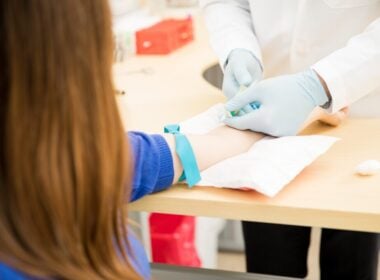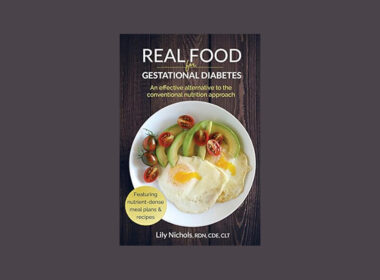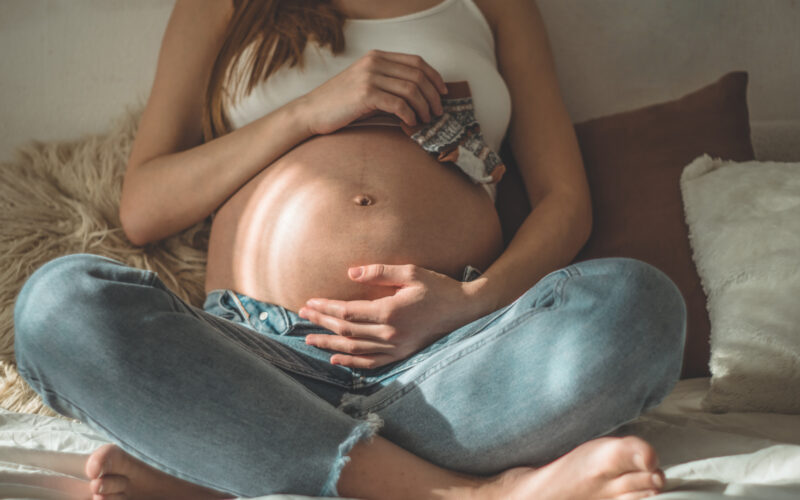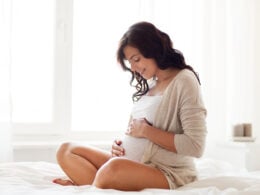To say that pregnancy is a time of bodily changes would be an understatement, as any mother could tell you. From stretch marks to hair growth (and then postpartum hair loss), swollen limbs to sleepless nights, “morning” sickness to dislocated rib heads (yes, that happened to me during pregnancy!), a woman’s body undergoes a multitude of physical, hormonal, and emotional shifts during the nine months of pregnancy. Some changes are temporary, like swollen feet; some may be longer-lasting, like stretch marks. While we tend to think of these developments as largely negative, there are actually a surprising number of health benefits of pregnancy, both during and after!
Improved overall health
One of the first topics covered in an early prenatal appointment with a midwife or OB-GYN is the subject of basic good health: what to eat, how much to drink, how to get a good night’s sleep, and what kind of vitamins to take. A woman’s health is of particular concern at this period because of the decreased risk of pregnancy and infant complications associated with general good health. As a result, many pregnant women find themselves forming healthy habits that last beyond their pregnancy–for example, many women who quit smoking during a pregnancy continue to do so after birth because they don’t want to expose their newborn to smoke. Exercising regularly, cutting habits like smoking, eating whole foods, refraining from sugar, watching out for excessive caffeine intake, avoiding toxins–these are all lifestyle choices encouraged during pregnancy that often continue into postpartum and beyond. In addition to (and perhaps because of) these lifestyle changes, working parents who have two or more kids also demonstrate increased productivity in the workplace [1]!
The power of breastfeeding
While breastfeeding is a separate phenomenon from pregnancy, pregnancy is a necessary precursor to this natural physiological sequel to childbirth (even if some women cannot or choose not to breastfeed). In a twelve-year study of 3,758 women who had been pregnant, the rate of death by cardiovascular disease (CVD) was studied along with history of low birth-weight infants and breastfeeding. While the study focused on whether pregnancy complications (such as low birth weight) were indications of future cardiovascular disease in mothers, the major finding of the study was incredible: breastfeeding was found to reduce the risk of CVD-related death for moms by 24% [2]. Considering that CVD is the leading cause of death for women in the United States, this is a significant finding. Breastfeeding women tend to have better heart health in general, since, as discussed in the previous section, they are more likely to avoid smoking, get regular exercise, and report more healthy behaviors. Additionally, breastfeeding reduces the risk of Type 2 diabetes, and women who breastfeed for 15 months or longer have reduced risk of developing autoimmune diseases, rheumatoid arthritis, and multiple sclerosis.
Possible decrease in period pain and endometriosis symptoms
Have you heard or read that decreased period pain may be a health benefit of pregnancy? There is not much scientific evidence showing conclusively that period pain is reduced after pregnancy, even though some women do experience better periods after having a baby. This suggests that individual female bodies react to the phenomenon of childbirth in a wide variety of ways. Some women will experience better periods after having a baby, and some will not. However, women with endometriosis will often find a decrease in their symptoms during pregnancy, and some even find that this continues after birth as well, due to structural changes in the pelvis. Scientists “aren’t sure why” menstrual pain sometimes reduces after childbirth; but considering that uterine contractions (specifically from orgasming during sex) during menstruation can ease cramping, reduced overall pain after the major uterine event of childbirth seems to make sense.
Reduced risk of cancers
Perhaps the biggest health benefits of pregnancy are its long term cancer-protective effects. As este artículo notes, pregnancy reduces the risk of several cancers–uterine, ovarian, endometrial, and breast cancers. A first pregnancy before the age of 30 and multiple pregnancies both lower breast cancer risk. Breastfeeding lowers the risk of breast cancer and ovarian cancer, too, potentially due to the natural suppression of ovulation that often accompanies breastfeeding, which translates to decreased ovarian cell division and growth, and thereby fewer opportunities for cancer cells to grow [3]. The elevated presence of progesterone during pregnancy is thought to be the reason why risk of endometrial cancer is also decreased, and even more incredibly, subsequent pregnancies (up to eight) continue to decrease the risk by increments of 15% [4].
As noted previously, CVD is the number one cause of death for women in the US, but cancer is the runner-up. Having personally known many people who have fought cancer, this knowledge is encouraging. Women ought to know that not only having a single child but even having multiple children, can produce incredibly boosted chances against this all-too-common disease. Furthermore, breastfeeding, as we’ve seen, adds additional benefits and ought to be encouraged as much as possible for any new mother (in the words of the Centers for Disease Control and Prevention, breastfeeding is the “clinical gold standard”!).
How does fetal microchimerism lead to health benefits of pregnancy?
The final health benefit of pregnancy is a fascinating one: a phenomenon known as fetal cell microchimerism (FCM). This is where DNA from the baby, bits of the placenta, and fetal cells from a baby’s body cross over into the mother’s body during pregnancy, and stay there long–even decades–after birth. More research needs to be done on FCM, but nevertheless, findings indicate that it can play a role in fighting breast cancer, as more chimeric cells have been found in women without breast cancer versus in women who had breast cancer [5]. Fetal cells have also been found in C-section wounds, suggesting that these cells get to work to promote healing of maternal tissue [6].
Decreased risk of rheumatoid arthritis is another possible benefit. Interestingly, este estudio notes that while FCM can pass cells over to the mother that aumentar the risk of rheumatoid arthritis, women who have had children are in general at lower risk for contracting this disease [7]. Mixed results are not new in the study of FCM, but it does seem that the more FCM is studied, the more positive the results become. Fetal microchimerism from male babies, specifically, has been associated with increased longevity in women, with a 5-20% increase of survival as women (around 60 years old and on) continue to age [8]!
The bottom line on the health benefits of pregnancy
In the short-term, pregnancy and childbirth can wreak a good deal of havoc on the body, both physically and mentally. Space needs to be given for rest, nutrition, exercise, and other gentle means of self-care to allow a woman’s body to heal, especially postpartum. But our long-term health gets quite the benefit from having children, and in some cases, the more the better!
He escrito antes about the ecological benefits of having children, and it is a joy to discover that this very natural process in a woman’s life seems to have even more intentional design to it than I had originally thought. From cancer-fighting benefits to the health benefits of fetal cell microchimerism, birthing a baby kickstarts a whole panorama of biological processes that we are only beginning to understand–but what we have started to uncover is incredibly encouraging, both for our own health and that of every mother on our planet.
Referencias:
[1] Krapf M, Ursprung H, Zimmerman C. “Parenthood and productivity of highly skilled labor: Evidence from the groves of academe.” Journal of Economic Behavior & Organization, vol. 140 (2017): pp. 147-75. https://doi.org/10.1016/j.jebo.2017.05.010 [2] Reddy, S.M., Tsujimoto, T.H.M., Qaqish, B.F. et al. Pregnancy-related factors may signal additional protection or risk of future cardiovascular diseases. BMC Women’s Health 22, 528 (2022). https://doi.org/10.1186/s12905-022-02125-x [3] Babic, Ana et al. “Association Between Breastfeeding and Ovarian Cancer Risk.” JAMA oncology vol. 6,6 (2020): e200421. doi:10.1001/jamaoncol.2020.0421 [4] Jordan, Susan J et al. “Pregnancy outcomes and risk of endometrial cancer: A pooled analysis of individual participant data in the Epidemiology of Endometrial Cancer Consortium.” International journal of cancer vol. 148,9 (2021): 2068-2078. doi:10.1002/ijc.33360 [5] Kallenbach LR, Johnson KL, Bianchi DW. Fetal cell microchimerism and cancer: a nexus of reproduction, immunology, and tumor biology. Cancer Res. 2011 Jan 1;71(1):8-12. doi: 10.1158/0008-5472.CAN-10-0618. PMID: 21199793; PMCID: PMC3059599. [6] Mahmood, Uzma, and Keelin O’Donoghue. “Microchimeric fetal cells play a role in maternal wound healing after pregnancy.” Chimerism vol. 5,2 (2014): 40-52. doi:10.4161/chim.28746 [7] Guthrie KA, Gammill HS, Madeleine MM, Dugowson CE, Nelson JL. Parity and HLA alleles in risk of rheumatoid arthritis. Chimerism. 2011 Jan;2(1):11-5. doi: 10.4161/chim.2.1.15424. PMID: 21547030; PMCID: PMC3084950. [8] Mads Kamper-Jørgensen, Henrik Hjalgrim, Anne-Marie Nybo Andersen, Vijayakrishna K Gadi, Anne Tjønneland, Male microchimerism and survival among women, International Journal of Epidemiology, Volume 43, Issue 1, February 2014, Pages 168–173, https://doi.org/10.1093/ije/dyt230Lecturas complementarias:
¿Su dieta durante el embarazo está al día con la ciencia?
The fourth trimester guidebook: Your postpartum mental health matters
The fourth trimester guidebook: Postpartum healing and exercise











